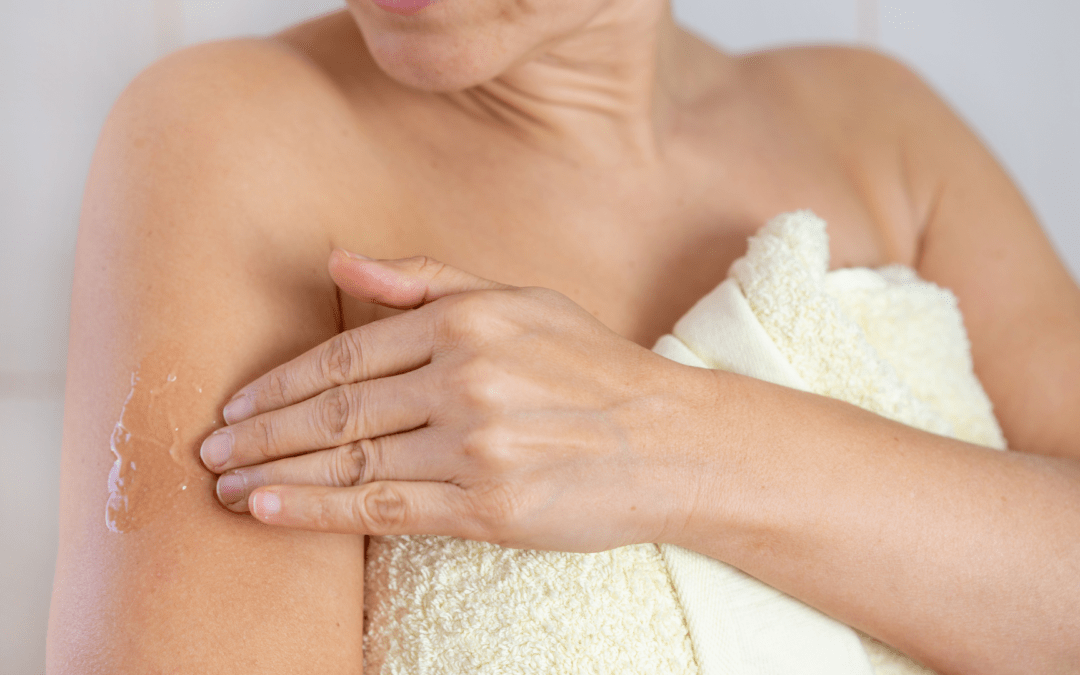According to the American Academy of Dermatology, women could lose about 30% of their skin’s collagen within the first five years after menopause.
At the same time, metabolism slows, muscle mass declines, and the body’s ability to recover from exercise changes—all quietly, but steadily.
You might notice it first in the mirror: skin that feels thinner, a waistline that’s harder to manage, workouts that leave you sore longer than they used to.
None of these changes mean you’re doing something wrong.
They mean your body is moving into a new chapter—one that requires different kinds of support, not more self-blame.
Estrogen plays a critical role in how your skin stays firm, how your muscles stay strong, and how your energy stays steady.
When hormone levels shift, the body shifts with them.
The good news? These changes aren’t inevitable or irreversible.
Small, smart adjustments can make a profound difference in how you look, feel, and move through this next phase of life.
Let’s walk through exactly what’s happening—and how you can work with your body to feel your best.
How Estrogen Affects Your Skin
Estrogen plays a key role in keeping your skin strong, smooth, and vibrant. It’s not just about aging—it’s about biology.
Here’s what estrogen does for your skin:
-
- It stimulates collagen and elastin, the proteins that keep skin firm and elastic
- It helps lock in moisture, so your skin stays soft and hydrated
- It boosts blood flow, delivering oxygen and nutrients that give your skin that healthy glow
As estrogen levels drop during perimenopause and menopause, you may notice:
-
- Faster collagen loss, which can lead to sagging and fine lines
- Thinner, drier skin that feels more sensitive or irritated
- A gradual loss of radiance—skin might look duller or less resilient
At the cellular level, this is all tied to estrogen receptors in the skin. When estrogen binds to those receptors, it triggers collagen production. When estrogen declines, your skin’s ability to repair and replenish slows down too.
What Can Help:
- Use moisturizers with hyaluronic acid, ceramides, and peptides to rebuild hydration and support the skin barrier
- Apply broad-spectrum sunscreen (SPF 30 or higher) every day—UV damage can accelerate thinning and dryness
- Stay hydrated from the inside, too—healthy fats (like avocado, walnuts, and salmon) help keep skin supple
Myth vs Fact:
➔ Myth: You need expensive serums or in-office treatments to fix menopause skin.
➔ Fact: The biggest difference comes from consistent care: gentle hydration, sun protection, and lifestyle support over time.
How Estrogen Affects Your Weight and Body Shape
Estrogen is involved in far more than just reproductive health—it also plays a vital role in how your body manages weight, energy, and muscle tone.
When estrogen is balanced, it helps:
-
- Regulate how and where your body stores fat
- Support muscle building and recovery
- Maintain a steady metabolic rate
But as estrogen levels decline during perimenopause and menopause, your body’s patterns start to shift:
-
- Fat tends to accumulate around the abdomen instead of the hips and thighs
- Muscle mass decreases, even if you haven’t changed your diet or activity level
- Metabolism slows slightly, which can make weight gain feel sudden or harder to manage
On a cellular level, estrogen plays a role in muscle protein synthesis—the process your body uses to build and maintain lean muscle. When estrogen falls, this process becomes less efficient, making it easier to lose muscle and harder to keep weight stable.
What Can Help:
-
- Strength training 2–3 times a week is one of the most effective ways to maintain and rebuild muscle (try bodyweight exercises, resistance bands, or light weights)
- Vary your protein sources—include fish, tofu, legumes, dairy, poultry, and lean meats to give your muscles the building blocks they need
- Work with a trainer if you’re new to strength workouts—learning proper form can protect your joints and help you get more from your time and energy
- Prioritize movement every day, even in small ways: walk, stretch, dance, or take the stairs
A Helpful Reminder:
You don’t need punishing workouts or a perfect meal plan.
What your body needs now is consistency, recovery, and strength-building that meets you where you are.
How Estrogen Affects Workout Recovery
Estrogen doesn’t just impact how your body moves—it also affects how well your body recovers after movement.
When estrogen is present at healthy levels, it helps:
-
- Speed up muscle repair after workouts
- Reduce inflammation, keeping post-exercise soreness in check
- Support tendons and ligaments, helping you stay flexible and less prone to strain
As estrogen declines, recovery tends to feel different:
-
- Soreness may linger longer than it used to
- You might feel stiff or achy, especially in the joints
- Intense workouts may take more out of you, and rest days start to matter more
What Can Help:
-
- Add mobility work to your routine—dynamic stretching before a workout, foam rolling or gentle yoga after
- Alternate your workout intensity—don’t stack high-intensity days back-to-back; pair strength with walking or restorative movement
- Support recovery with small extras like Epsom salt baths, gentle stretching, or magnesium-rich foods or supplements (with your provider’s guidance)
Reminder Worth Repeating:
Rest isn’t quitting—it’s strategy.
The right kind of recovery helps your body build back stronger instead of breaking down.
Why Hormone Testing Can Help You Train and Feel Better
If you’re struggling with stubborn body changes that don’t make sense, it’s worth checking your hormones.
Testing can reveal:
-
- Your current estrogen, progesterone, and testosterone levels
- Thyroid imbalances that slow metabolism
- Cortisol patterns that impact energy, muscle mass, and belly fat
- Vitamin D or calcium deficiencies that affect bones and muscle strength
Having this information gives you a map—not just random advice that might not fit your body right now.
Final Thought: You’re Not Fading—You’re Shifting
Your skin, your energy, your body—it’s not falling apart.
It’s adapting.
You’re not “less than” because your body needs different things now.
You’re becoming a smarter, stronger version of yourself—one that deserves new kinds of care and support.
Small shifts in skincare, workouts, and recovery can make an enormous difference.
And the more you understand what’s happening inside, the more powerful you become outside.
If You’d Like Personalized Support Navigating These Changes
Every woman’s experience with menopause is different—and so is the path to feeling better.
If you’ve been trying to adjust your workouts, support your skin, or manage your energy but still feel stuck, you don’t have to figure it out alone. Sometimes, your body needs more than generic advice—it needs a plan tailored to your hormone levels and lifestyle.
That’s where Amazing Meds comes in.
We help women understand exactly what’s shifting inside their bodies—and what to do about it with care that’s personalized, not cookie-cutter.
Our support includes:
-
- Comprehensive hormone testing (estrogen, progesterone, thyroid, cortisol, and more)
- Personalized plans for metabolism, energy, skin, and strength
- Treatment options like BHRT, nutrition, supplements, and ongoing guidance
👉 Schedule a private consultation here if you’re ready to stop guessing—and start feeling like yourself again.
Disclaimer: This blog is for educational purposes only and is not a substitute for professional medical advice, diagnosis, or treatment. Always consult your healthcare provider with any questions regarding your health.

Celeene Rae
Writer & Blogger @ Amazing Meds


0 Comments